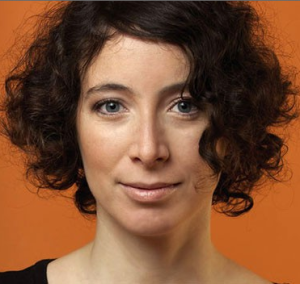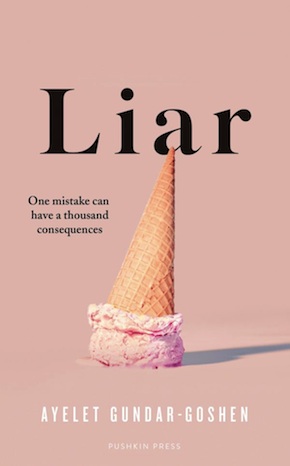The incident
by Ayelet Gundar-GoshenOver the long days she spent behind the counter, Nofar had developed a habit – she looked into the customers’ faces and tried to guess which of them had come into the ice-cream parlour by accident and which were there by design. The accidental visitors were nicer: people strolling leisurely down the street, sailing along like fish until the ice-cream parlour’s welcoming sign appeared and reeled them in on its line. The ones who planned to be there were totally different, people for whom the ice-cream parlour served an actual purpose: compensation for a hard day’s work, the object of desire of a crushed heart. She saw it in their darting eyes, in their tight mouths that insisted on tasting more and more flavours, all of them unsatisfying. That kind of customer gulped down his ice-cream cone as if it were a headache pill: quickly, so it would have an immediate effect.
Nofar could easily see that the customer waiting at the counter now belonged to the intentional group. It wasn’t a leisurely stroll that had led him there, but rather a disastrous day. She said good evening and wasn’t surprised when he didn’t reply. She asked what she could get for him, trying hard to smile even though she was exhausted from her dash across the alley and the barrenness of the summer. The guy looked her over impatiently and grumbled that he’d been standing there for ten minutes already. How long did a person have to wait for service in this place?!
When the echoes of the scandal died down a bit, Avishai Milner would wonder whether it had all started at that moment. A girl looking at him with blank eyes from the other side of the counter.”
That wasn’t accurate. He hadn’t been standing there for ten minutes. In fact, he’d been standing there for less than five. But during those five minutes, he’d received a text from his agent saying that the TV bigwigs had thought it over and decided they didn’t need another talent show. What his agent didn’t say was that even if the bigwigs had been convinced they did need such a show, they still didn’t need the services of a singer whose glory days were behind him. Seven years behind him, to be precise. It was unbelievable how quickly seven years could pass. Only a minute ago he’d been riding high, his picture on the front pages of newspapers, one and a half million texts sent to him on that amazing night, an entire country sending him its love in digital letters. Now he was here, in this pathetic ice-cream parlour standing in front of this pathetic girl who looked at him, expecting to hear what flavour he wanted, and there wasn’t the slightest hint of recognition on her face. She didn’t know who he was.
Later, when the echoes of the scandal died down a bit, Avishai Milner would wonder whether it had all started at that moment. A girl looking at him with blank eyes from the other side of the counter, and in that blankness he lost his soul. There he was, sinking, drowning in the darkness of anonymity, in the abyss of ordinariness. Across the counter from the girl, Avishai Milner couldn’t breathe. With his last ounce of strength, he fought to remind himself that he wasn’t just another customer, he was Avi-shai! Mil-ner! That was how the presenter on the finale had introduced him, slicing his name as if it were hot, fresh bread, lengthening the syllables to the pleasure of the studio audience, Avi-shai! Mil-ner! And the viewers at home had applauded with one million votes. For the next several weeks his name was on everyone’s lips, beautiful women swooped down on him in pubs and clubs, wanting to taste him, wanting to be tasted by him, and he made love to them, but even more to himself. He screwed Avishai Milner’s brains out, and every nymph who sighed A-vi-shai in his ear was merely echoing that unforgettable moment when his name had been announced, when the presenter had opened the envelope, looked at the name with his kind, generous eyes, and in front of the huge audience in the studio and at home, crowned the small-town young man: Avi-shai! Mil-ner!
There’s no way of knowing what went wrong after that. Avishai Milner was neither a better nor a worse singer than Eliran Vaknin, who had been crowned by the same presenter the previous year and appeared on all the hit-parade lists to this day. Nor was he less good-looking than Assi Sarig, who was crowned the following year and had already played a tormented doctor in a TV series, a tormented soldier in another TV series, and the tormented father of an autistic child in a soon-to-be-released feature film. The fact that there was no reason for it, no personality defect that could be blamed, no lesson to be learnt – that was what tortured Avishai Milner more than anything. The total arbitrariness of his fall terrified him because it implied that his rise had also been arbitrary, not the product of his talent, but of a random set of circumstances.
Avishai Milner received his agent’s text after long weeks of anticipation. Since submitting his proposal to the TV bigwigs, his days had been suffocating and his sleep sporadic. Like a wild bull, Fame had tossed him over its shoulder and then kicked him as he lay on the ground. He had to find a way to rise again. The longer the bigwigs took to give their answer, the more nerve-racking it was. The presenter came to him in his dreams and held his hand, saying that after the commercial they would sing a duet together, but to his horror he couldn’t remember the words and the microphone turned into a terrifying snake in his hand. In short, he really did deserve ice cream. But when he went into the ice-cream parlour he found it empty. Outside, customers were sitting and eating happily, but behind the counter there was no one.
Someone who receives bad news in the middle of an ice-cream parlour – what does he need? A steady hand offering him a variety of chocolate comforts. A smiling face waiting patiently for him to speak. Eyes that look into his and confirm that yes, despite everything, he still exists. But when Nofar returned to the counter she didn’t recognize Avishai Milner, and although she did her best to smile, her smile couldn’t hide the sadness that emerged from beneath it, the way a too-small shirt she had once tried on couldn’t cover her embarrassed flesh. Avishai Milner didn’t know that the dress the girl was wearing belonged to her more beautiful sister. He didn’t know that she had made her way there every day that summer in the disappointed hope she would be rescued from ordinariness. All he knew was that he’d already been waiting ten minutes to be served here. And that was inacceptable.
“This is inacceptable,” Avishai Milner said to the girl standing opposite him, and to emphasize exactly how inacceptable it was he slammed his hand on the glass partition.
“Unacceptable,” the girl said.
“Excuse me?!”
“The word is ‘unacceptable’, not ‘inacceptable’.”
As the oldest daughter of a language teacher, Nofar knew very well that people hated nothing more than having their words corrected. No one would open a friend’s mouth while he was eating, pull out the food and demonstrate the right way to eat. And words, like food, belong to the tongue on which they rest. But then this customer came into the ice-cream parlour and stood across the counter from Nofar. A nasty guy who banged on the glass partition, leaving another greasy hand print. But not to point out a flavour. The hand that slammed on the glass wasn’t pointing to the mango sorbet or French vanilla. The guy wasn’t making a choice, he was asserting control: he banged on the glass partition simply because he could.
Nofar was seventeen years and two months old on that evening, and in all her days on earth it had never occurred to her to bang on a counter. That’s how it is, there are people who bang on counters and there are people who wait behind counters and ask, “What’ll you have?” But something burst inside her that evening. Yotam and Shir’s crew on the way to the cinema. Her sister’s dress. The humiliation of that depressing summer. She didn’t need this guy’s complaints. But if he insisted on complaining, then he should use the proper language. Otherwise it was unacceptable.
Avishai Milner looked in astonishment at the server who had corrected him. He’d never seen such chutzpah before. He had always considered himself a man of words. He’d written the lyrics to his songs himself. Now he mobilized all his skill to ram his words into the girl’s flesh. “You pie-faced moron! You stupid cow! You should tweeze your eyebrows before going out in public. And those pimples, didn’t anyone ever tell you not to squeeze them? You just need a few olives on your face and they can sell it as a pizza. But forget the face, what’s with that stomach of yours? Didn’t the owner of this place tell you that if you eat too much, you’ll look like a hippo? Who would ever want to fuck you, huh? I’ll take one scoop of cookie dough.” He handed her a 200-shekel note and Nofar, standing on the other side of the counter, automatically reached out to take it, like a chicken without a head that keeps running around for a few seconds. Her limbs repeated routine actions, taking a cone and scooping the ice cream into it, until the realization hit her that she had been decapitated, that the man had removed her head, her selfhood, and she threw down the cone and fled.
***
Some changes occur slowly. Geological erosion, for example, sometimes continues for tens of thousands of years. Water and wind do their job and gradually, bit by bit, a mountain ridge becomes a valley, a sea turns into a desert. Time, like a giant anaconda, crawls along lazily, swallowing up the tallest mountains. And some changes erupt all at once, like a match bursting into flame, and the “let there be light” of creation. The change that happened to Nofar was apparently of the second kind. She had walked the earth for seventeen years and two months and had never thought to pound on counters, much less to scream in alleys. But now, in the presence of that man who said those horrendous things to her, Nofar’s very soul shuddered. She ran out to the alley determined to disappear, but when that customer grabbed her hand she was suddenly overwhelmed by the opposite urge – to be heard. She screamed out the humiliation of the words he had hurled at her. She screamed out the humiliation of the words she had hurled at herself. She screamed out the disappointment of that summer and the summers before it. She screamed and screamed and screamed, and didn’t hear the police sirens arriving in response, or the fire engines that joined them, because so it goes, one jackal howls and one hundred jackals respond from the darkness. Nofar Shalev screamed and the city responded with screams of its own.
The poor girl trembled in the kind embrace because she knew it was true, he hadn’t done anything to her, that dirty-mouthed customer hadn’t done anything to justify the presence of two traffic cops and an army captain.”
The entire street hurried to see what was happening there, in that neglected alley, and since Nofar Shalev was the one it was happening to, everyone looked at her. The dreamy-eyed cashier. The red-haired saleswoman. Neighbours from their balconies. Two traffic cops. Even heavily pierced members of street gangs, the sort that never show an interest in other people and are never the object of other people’s interest, came to see what was happening. Nofar’s body was awash with the kind of light that radiates from fondly gazing eyes, and that light was now focused – wonder of wonders – on a girl who had never before attracted a lingering gaze. A pretty girl soldier, her blonde hair pulled back in a ponytail that burst from the rubber band like a fountain of light, held Nofar in a kind embrace and said, “Everything’s fine” with such certainty that it seemed she had the authority to say those words, not only in her own name but in the name of the entire defence establishment. Nofar gave herself over to the warm embrace, feeling as if she had never been hugged that way before. The light fragrance of the perfume worn by the fairy godmother in uniform enveloped her along with another more masculine scent, that of the officer who only a moment earlier on the street had encircled the girl soldier’s waist with his arm before hurrying with her to the alley after they heard the scream. As she held Nofar in her arms to comfort her, the officer and two traffic cops held Avishai Milner and demanded to know what he had done to the girl to frighten her so badly.
Nothing, he shouted, I didn’t do anything, and the poor girl trembled in the kind embrace because she knew it was true, he hadn’t done anything to her, that dirty-mouthed customer hadn’t done anything to justify the presence of two traffic cops and an army captain. A citizen of the country was certainly permitted to skewer the heart of another citizen with his words. In another moment, she’d have to say that to the gentle-eyed girl soldier, to the audience looking at her with the sort of affection she had never before experienced. Everyone was so friendly, so interested – what would they say when they discovered that nothing had actually happened, that they had run all the way there for no reason? They would turn their backs on her instantly. The policemen would certainly rebuke her for causing such a fuss, and she would bow her head in submission, as she always did. Then she would return to the ice-cream parlour to serve the waiting customers, wipe the glass surface, ask, “Cup or cone?” and “What can I get for you?”
Suddenly he was filled once again with the familiar, addictive feeling of being at the centre of things… But the fact that the attention was negative shook him to the depths of his soul.”
And in truth, she would have been willing to accept all that if Avishai Milner hadn’t opened his filthy mouth again. It seemed that he hadn’t vented all his fury. Or perhaps it had been recharged, like those almost dead phones that are suddenly revived by a newly found source of power. So it was with Avishai Milner, peoples’ glances replenished him. How much he had missed that audience, young and old, soldiers and policemen – as the presenter used to say, the entire country is here with us. Suddenly he was filled once again with the familiar, addictive feeling of being at the centre of things, the object of frenzied public attention exploding all around him. But the fact that the attention was negative – no one threw flowers to him, no one applauded him – shook him to the depths of his soul. The audience’s affection was lawfully his. He couldn’t let that hippo who had kept him waiting at the counter, who had dared to correct his language and had run off with his money, steal what was rightfully his.
Once again, he snarled his nasty words at the girl, and words, like hot-air balloons, take off when the flame under them is lit: “You disgusting hippopotamus, I wouldn’t touch you with a ten-foot pole,” and a host of other pejorative words and phrases. The girl’s eyes filled with tears – first he had insulted her when no one else was around, and now he was ridiculing her in front of everyone. In despair, she moved out of the pretty girl soldier’s embrace, began to cry in earnest and covered her face with her hands. Beyond her hands rose a monumental brouhaha, everyone was asking questions at once, but, deafened by her own sobs, Nofar didn’t hear, and it wasn’t her fault that observers took her sobbing as confirmation. They asked, “Did he touch you?” and the covered face trembled, that is, replied in the affirmative, and each additional sob was further confirmation, each additional sob was the next day’s headline. Suddenly, miraculously, the following story emerged from a neglected alley – refugee from reality TV accused of attempted rape of minor – and everyone looked at the newborn story and saw it was good.
from Liar, translated by Sondra Silverston (Pushkin Press, £12.99)
 Ayelet Gundar-Goshen is an award-winning novelist and clinical psychologist based in Israel. Her previous novels One Night, Markovitch and Waking Lions have been translated into 14 languages. She is an occasional correspondent for the BBC, Time magazine and Israeli media. Liar is published by Pushkin Press.
Ayelet Gundar-Goshen is an award-winning novelist and clinical psychologist based in Israel. Her previous novels One Night, Markovitch and Waking Lions have been translated into 14 languages. She is an occasional correspondent for the BBC, Time magazine and Israeli media. Liar is published by Pushkin Press.
Read more
@PushkinPress
Author portrait © Alon Sigavi
Sondra Silverston was born in New York and has lived in Israel since 1970. She has translated works by Amos Oz, Etgar Keret and Eshkol Nevo. Her translation of Amos Oz’s Between Friends won the 2013 National Jewish Book Award for fiction.




